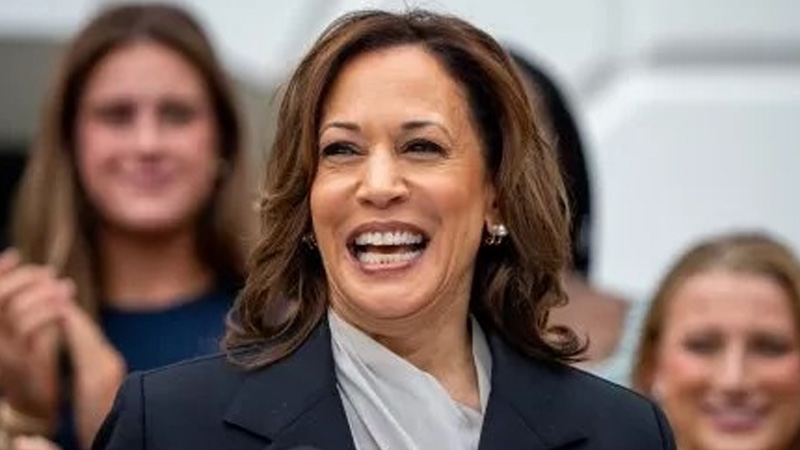Harris’ Bold Claim Backfires as Vance’s Counterattack Exposes Hidden Truth, Leaving Viewers Stunned

Photo Credit: Getty Images
Vice President Kamala Harris’ recent attempt to label Senator JD Vance as “weird” has backfired spectacularly, as Vance’s swift counterattack exposed a hidden truth that left viewers stunned. The political landscape was shaken when Vance, Trump’s running mate, skillfully turned the tables on Harris, revealing unexpected insights into the Democratic campaign strategy.
According to a report by Newsweek on Tuesday, August 6, 2024, the controversy began when Harris and her allies launched an attack on Vance, focusing on his past comments about women, abortion, and childless couples. However, what was intended to be a damaging blow to the Republican ticket quickly transformed into a revealing moment that caught many off guard.
Chris Quinn, editor of cleveland.com/The Plain Dealer, inadvertently added fuel to the fire during an interview with MSNBC’s Nicolle Wallace. Quinn, repeating the “weird” label, stated, “I wish we had come up with the word ‘weird’ because it is so appropriate for what he’s saying.” This comment, meant to criticize Vance, instead opened the door for a deeper examination of Ohio’s political landscape.
Quinn went on to explain, “I don’t think we’re surprised at all at the statements that are coming out now because of the way Ohio works. I don’t know if people realize that more than 70 percent of this state is not registered with a political party. So when it comes to the party primaries, it’s a very small percentage of people that make that selection, and it has turned the primaries into just a competition to be the most outrageous.”
This revelation about Ohio’s political makeup provided Vance with an unexpected opportunity. In a masterful counterattack, Vance seized upon Quinn’s words to highlight the disconnect between the Democratic campaign’s tactics and the reality of Ohio’s diverse electorate.
Vance’s response was swift and effective. He pointed out that the “weird” label was a superficial attempt to discredit him without addressing the real issues facing Ohio voters. “I’m a pretty normal guy. I’ve got a wife and kids, and I like to hang out and watch football. And I care about this stuff because I care about the country,” Vance stated, effectively humanizing himself in the face of the attack.
But Vance didn’t stop there. He went on to expose what he claimed was the true source of the “weird” narrative. In an interview on the Full Send podcast, Vance suggested that the attack line comes from Harris’ “24-year-old social media interns who maybe were bullied in school and so now they’ve decided they’re going to do the same thing.” This statement not only deflected the criticism but also raised questions about the authenticity and maturity of the Democratic campaign’s strategy.
The impact of Vance’s counterattack was immediate and profound. Viewers were left stunned as they realized the complexity of Ohio’s political landscape and the potential disconnect between national campaign strategies and local realities. The revelation that over 70% of Ohio’s voters are not registered with a political party suddenly cast doubt on the effectiveness of partisan attacks like the “weird” label.
Adding to the drama, Quinn’s comments about Ohio’s primary system further exposed the hidden truths of the state’s political process. “If we had open primaries in Ohio, [Vance] wouldn’t have won. The center of Ohio would never have chosen him to be on the final ballot, but the small group of people now that are picking the candidates are as fringe as you get, so you’ve got to make ‘cat lady’ comments to get on the ballot,” Quinn explained.
This statement, intended to criticize Vance, instead highlighted the flaws in the primary system and raised questions about the true representation of Ohio’s voters in the political process. Vance skillfully used this information to position himself as a candidate who understands and represents the diverse interests of Ohio’s electorate, rather than just appealing to a small, partisan base.
The backfire of Harris’ attack strategy became even more apparent when polling data was revealed. A Data for Progress poll showed that while 79 percent of voters, including 78 percent of independents, think that “insulting women and couples who don’t have children” is a “weird” thing for a political figure to say, the same poll indicated that voters agree Republicans are “weirder” today than they were 10 years ago by a margin of 26 points. Vance used this data to argue that the “weird” label was a simplistic and outdated approach to complex political issues.
As the dust settled, political analysts began to reassess the impact of this exchange on the upcoming election. Quinn suggested that Trump’s choice of Vance as his running mate might actually hurt the GOP’s chances in Ohio. “Trump wasn’t a felon when he ran before. Now he is, and people in Ohio, in the center, pay attention to things like that, and it could be that they just don’t want to vote for him or Vance,” Quinn said.
However, Vance’s effective counterattack has potentially changed this calculus. By exposing the hidden truths of Ohio’s political landscape and questioning the authenticity of the Democratic campaign’s tactics, Vance has positioned himself as a candidate who understands the nuances of Ohio’s electorate.





